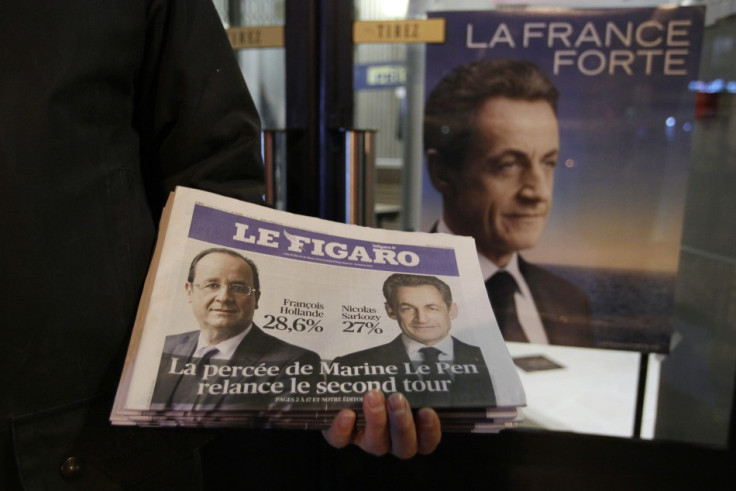Austerity Woes Make for a Week to be in Opposition

On Monday 23 April 2012 a Guardian newspaper headline read: "Conservatives turn three-point opinion poll lead into eight-point deficit" in a story which illustrated the travails of being in government and not getting the PR quite right - on this occasion over Chancellor George Osborne's Budget. The poll covering Westminster voting intentions, was conducted for the newspaper by ICM and showed that the Conservatives had slumped to 33 per cent, a fall of six per cent which accounted for nearly all of Labour's gain of five per cent to 41 per cent.
There was no change to the Liberal Democrat vote at 15 per cent whilst all other parties scored a combined total of 12 per cent - up two per cent. ICM's poll gave the UK Independence Party, UKIP, three per cent, which the newspaper admits is lower than some other polls have given the party, whilst the Scottish national Party scored four per cent, the Greens two per cent and Plaid Cymru (Welsh Independence Party) and the far-right British National Party, one per cent each.
Conservative and Liberal Democrat coalition partners are bracing themselves for some poor results in the upcoming Local Council Elections.
Meanwhile, in the French Presidential Election, First Round results from the Sunday 22 April ballot were recording an upset for President Nicolas Sarkozy who was running for a second successive term in the Élysée. Though not unexpected as the President had trailed the Socialist Party winner, François Hollande throughout the campaign, Mr Sarkozy has a mountain to climb if he is to remain President. This is especially so looking from a Department (French county) basis in the country's North, Brittany, most of Greater Paris and the bulk of France south of the River Loire. Not too much then!
The decidedly higher turnout than had widely been expected of 79.5 per cent of the electorate, clearly favoured the candidates opposing the President and probably justified the enormous efforts made by Mr Hollande's Socialist Party in getting out their vote. The same is true for Mr Mélenchon's Left Party and Marine Le Pen's National Front and both Mr Hollande and Ms Le Pen seem to have attracted the young, working-class vote in particular.
The media, and not just the left-wing papers and commentators are already hailing Mr Hollande as France's next President to be crowned on 06 May and it does not look too good for Mr Sarkozy. Not only must he make up the 519,000 vote lead that Mr Hollande takes into the second round, he has probably the difficult task of "going over the head" of Marine Le Pen, the National Front leader who came a strong third with over 6.4 million votes (17.90 per cent).
Although the President veered to the right during the first round campaign, acknowledging the very serious threat posed from this quarter, Mr Sarkozy has since ruled out any deal with Ms Le Pen and the National Front so there will be no chance of any Ministerial positions for the far-right in any future Sarkozy-led government.
For her part, Marine Le Pen is in no hurry to endorse Mr Sarkozy even though giving her backing to someone on the left might seem odd. In part this could be due to the notion that Mr Hollande is markedly more to the centre in politics than his Socialist Party but there is also a possibility that if Mr Sarkozy does badly in the second round then the loose right-wing party he leads, the Union for a Popular Movement, might fall apart leading to Ms Le Pen's eventual rise as the right-wing champion and spokesperson in France.
To stand any reasonable chance of retaining power, the French media reckon that President Sarkozy will need about 80 per cent of the National front votes in the second round.
Mr Holland however, has no such problem with his left-wing rival, Jean-Luc Mélenchon who got almost four million votes and 11.10 per cent of turnout with a stronger performance than had been anticipated. The man of the Left has already fully endorsed Mr Hollande in Sunday's ballot.
The really big disappointment - Mr Sarkozy apart - was the massive drop in the vote for the centre party candidate, the Democratic Movement's François Bayrou who managed to get only 3.275 million votes and 9.13 per cent of the ballot when in the 2007 Presidential Election he achieved over double this tally with 18.57 per cent of the electorate.
Expect most of Mr Bayrou's supporters to transfer to Mr Sarkozy, but, awkwardly, Mr Sarkozy's fate looks very tied to the National Front swinging behind him in the second round.
Bad polls, bad election results for those in power with little of real cheer to offer! Coming in three's? Also on Monday 23 April, the Netherlands coalition government of Prime Minister Mark Rutte collapsed in acrimony after failing to agree on a plan to bring the country's deficit into line with European Union guidelines - three per cent of GDP or under.
The Office of the Monarch, Queen Beatrix, announced later that it had accepted the resignation of the Prime Minister and his Cabinet. This followed from Geert Wilders and the far-right party withdrawing their support. New elections will be held in the autumn.
To round off a thoroughly bad week for the EU, Romania's Government fell on friday 27 April, losing a Vote of Confidence in an attempt to push through austerity measures designed to secure a €5 billion IMF Credit Facility.
Could be years of this in Europe to come!
© Copyright IBTimes 2024. All rights reserved.






